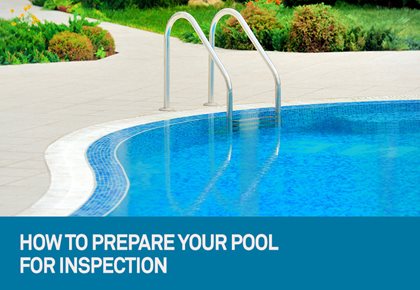Wednesday September 02, 2015
 The professionals at American Pool Enterprises, the largest swimming pool management company in the U.S., offer five proven tips to help you prepare for your next pool inspection. So the next time a health inspector is on the way, remember...
The professionals at American Pool Enterprises, the largest swimming pool management company in the U.S., offer five proven tips to help you prepare for your next pool inspection. So the next time a health inspector is on the way, remember...
1. Conduct your own pre-inspection.
The best way to prepare yourself is to conduct your own pool inspection. That way you can avoid any unpleasant surprises later on. Verify the water flow with a dye test, inspect all of your safety equipment to make sure it’s in good working order, tighten ladders and handrails, confirm necessary signage is visible, and examine all landscaping and fencing to be sure everything is in compliance. In addition, examine rescue tubes, telephones, first-aid kits, flow meters and pump-strainer baskets to ensure they’re all working properly. And don’t forget to check equipment that may have become dirty or damaged, like cracked tile. Disorderly or dirty pump rooms are another common infraction, as are hot water valves that have been turned off for an extended period of time.
2. Know the requirements for operational inspections.
Once summer arrives, operational inspections will be in affect. Do a periodic pool inspection so you can prepare and know the requirements. Loose or missing drain covers are common violations, so be sure everything is in place. Also, pay close attention to water chemistry, and be sure that if you have pool staff they are trained and licensed. Many communities are cited because chlorine levels are too low, the pH is too high or licenses aren’t current – chlorine and pH can be checked regularly (some states require hourly checks), so there’s no reason to be cited for improper levels.
3. The inspector is not your enemy.
It’s important to remember that the inspector’s job is to ensure your pool is safe for your residents and guests, therefore increasing your peace of mind and reducing your liability. Yes, citations for infractions can necessitate repairs, which may be inconvenient or expensive. Furthermore, seeing your upcoming inspection as an opportunity will help make the experience a lot less stressful. So on inspection day, keep the visit positive, friendly and informative. Be prepared to answer questions to ensure a pleasant and smooth experience for everyone.
4. Consider hiring a pool management company.
Effectively maintaining and managing a pool’s licensing and facilities can be overwhelming at times for a busy community manager. Your community association management company can recommend a quality pool management company to handle everything from A to Z. Even better, by eliminating potential violations and citations, your savings will likely offset the additional fees.
5. Know your regulations.
Swimming pool rules and regulations differ by state and often change over time – therefore, it’s crucial to keep up-to-date on all current state and local regulations to ensure compliance at all times. Again, a pool management company may be the best way to go if you don’t have time to stay abreast of the changing regulatory landscape.Fortunately, you don’t have to dive into all of these responsibilities alone. If you’d like more information on how a community association management company can assist your community, contact FirstService Residential, North America’s property management leader.